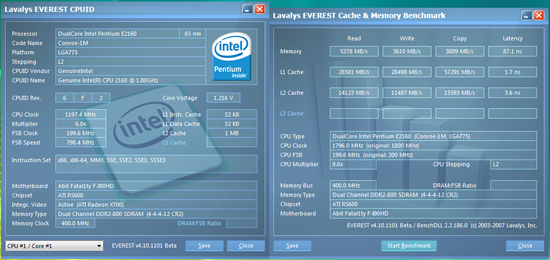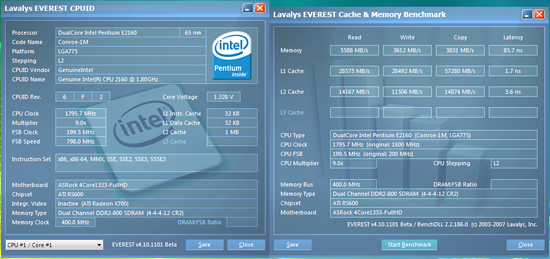µATX Part 1: ATI Radeon Xpress 1250 Performance Review
by Gary Key on August 28, 2007 7:00 AM EST- Posted in
- Motherboards
Memory Testing
All of our boards were able to run 4GB of OCZ HPC Reaper at DDR2-800 speeds on 2.04V or less. Our optimal timings for the two X1250 boards were 4-4-4-12 while we had to run at 5-5-5-15 on the MSI G33M board. The MSI board did not care for CAS4 settings with 4GB installed but the overall memory results are still very competitive. In fact, the Sandra unbuffered scores are around 12% better than our X1250 boards and in a couple of our application benchmarks that rely on memory throughput and low latencies, this advantage will be apparent.
abit Fatality F-I90HD Memory Tests
We were able to set our timings to 4-4-4-12 at DDR2-800 by increasing the memory voltage to 2.0V. This offered the best possible latencies and memory throughput on this board since overclocking of the memory is not available in the current BIOS. By increasing the voltage to 2.10V, we were able to improve timings to 4-4-3-10 with 4GB installed, but the differences in benchmark results were non-existent since memory sub-timings were relaxed to compensate for the tighter timings. Up until the 1.4 BIOS release, the board was very picky about booting with memory that did not allow or utilize 1.8V at POST. We could not boot several memory modules from a variety of suppliers that were set to operate with 2.0V+ during normal installation. This problem has greatly decreased with the later BIOS versions and we have booted with 4GB configurations with these same modules.
ASRock 4Core1333-FullHD Memory Tests
Like our abit board, the optimum settings at DDR2-800 with our OCZ HPC Reaper 4GB memory configuration are 4-4-4-12, although with the additional memory timing options in the BIOS we were able to dial tRFC from 42 on the abit board to 28 on this ASRock board. This change along with generally more aggressive memory sub-timings from ASRock resulted in slightly lower latencies and higher memory throughput in our Everest benchmarks. We had to set our memory voltage to 2.04V to complete our benchmark tests, though the board otherwise booted and ran fine at 1.8V.
ASRock also offers an option to set the memory speed to DDR2-1066 although our memory is not capable of those speeds. We tried a few DDR2-1066 modules from OCZ, Corsair, and G.Skill that worked at 5-5-5-15 timings with 2.04V. Our benchmark results in actual applications did not vary more than 1% with the E2160 so our opinion is that DDR2-800 at CAS4 timings is optimal for this board. Interestingly enough, our memory scores also didn't vary by more than 1% when utilizing an external graphics card.
 |
| Click to enlarge |
All of our boards were able to run 4GB of OCZ HPC Reaper at DDR2-800 speeds on 2.04V or less. Our optimal timings for the two X1250 boards were 4-4-4-12 while we had to run at 5-5-5-15 on the MSI G33M board. The MSI board did not care for CAS4 settings with 4GB installed but the overall memory results are still very competitive. In fact, the Sandra unbuffered scores are around 12% better than our X1250 boards and in a couple of our application benchmarks that rely on memory throughput and low latencies, this advantage will be apparent.
abit Fatality F-I90HD Memory Tests
 |
| Click to enlarge |
We were able to set our timings to 4-4-4-12 at DDR2-800 by increasing the memory voltage to 2.0V. This offered the best possible latencies and memory throughput on this board since overclocking of the memory is not available in the current BIOS. By increasing the voltage to 2.10V, we were able to improve timings to 4-4-3-10 with 4GB installed, but the differences in benchmark results were non-existent since memory sub-timings were relaxed to compensate for the tighter timings. Up until the 1.4 BIOS release, the board was very picky about booting with memory that did not allow or utilize 1.8V at POST. We could not boot several memory modules from a variety of suppliers that were set to operate with 2.0V+ during normal installation. This problem has greatly decreased with the later BIOS versions and we have booted with 4GB configurations with these same modules.
ASRock 4Core1333-FullHD Memory Tests
 |
| Click to enlarge |
Like our abit board, the optimum settings at DDR2-800 with our OCZ HPC Reaper 4GB memory configuration are 4-4-4-12, although with the additional memory timing options in the BIOS we were able to dial tRFC from 42 on the abit board to 28 on this ASRock board. This change along with generally more aggressive memory sub-timings from ASRock resulted in slightly lower latencies and higher memory throughput in our Everest benchmarks. We had to set our memory voltage to 2.04V to complete our benchmark tests, though the board otherwise booted and ran fine at 1.8V.
ASRock also offers an option to set the memory speed to DDR2-1066 although our memory is not capable of those speeds. We tried a few DDR2-1066 modules from OCZ, Corsair, and G.Skill that worked at 5-5-5-15 timings with 2.04V. Our benchmark results in actual applications did not vary more than 1% with the E2160 so our opinion is that DDR2-800 at CAS4 timings is optimal for this board. Interestingly enough, our memory scores also didn't vary by more than 1% when utilizing an external graphics card.










22 Comments
View All Comments
Griswold - Wednesday, August 29, 2007 - link
There are a couple SM2.0 patch projects for bioshock out there. Google for it.mostlyprudent - Tuesday, August 28, 2007 - link
I am looking forward to the rest of the series.